- Home
- Nancy Pickard
Twilight Page 2
Twilight Read online
Page 2
Nellie had more than kept her end of our ten-month bargain.
And now, I would honor my I.O.U. to her, any way, any time—which looked like it would be … right now.
I just hadn’t anticipated such a dramatic response on her part, not from this brisk and efficient woman who wasn’t ordinarily given to emotional outbursts. To tell the truth, neither had I expected Nellie to cash in my I.O.U. quite so soon! But I placed my free hand over my heart and smiled as I pledged her my mock-solemn troth:
“Whatever it is, by God, I’ll do it.”
“Oh, Jenny.” Her hand relaxed and slipped away from mine as if she were embarrassed to have gotten so personal as to touch me. She really was quite a businesslike person, pleasantly brisk and even rather formal at times. But her eyes filled with apparent tears, and I was startled to see her lips briefly tremble. What floodgates had I breached here with my easy gift of gratitude? She said, “There’s a young woman that I want you to help. Melissa Barney. Do you know her?”
“I don’t think so.”
“You recognize her name though, don’t you? It was in the paper last month when her husband died. Benjamin Barney. Do you remember now?”
I squinted, thinking.
“Kind of, yes, but tell me about it.”
“He got killed on God’s Highway, out by our house. At the crossing where the hiking path intersects with the road. A woman ran the stop sign at the top of the hill by our house, and she struck him and killed him. He left Melissa and their two little boys.”
“Oh … ,” I said, regretfully remembering. “That was so sad.”
By “God’s Highway” she meant a famous bicycle and hiking trail that wound over hill and dale through several Massachusetts counties on its popular way from Boston to the sea. It was actually right where our winter traffic pileup had occurred, though of course there hadn’t been anybody walking on the trail at the time, not at one o’clock in the morning in a snowstorm. The trail hadn’t had anything to do with it. But I knew of the nature trail, better and more personally, I suspected, than most people did. The foundation I had worked for, the Port Frederick Civic Foundation, had funded the local stretch of that controversial project ten years before.
Oh, yes, although I didn’t say so to Nellie, I knew God’s Highway very well.
Just a reference to it a whole decade later could still send an uneasy quiver snaking through my gut, and it was even now inspiring tears from Nellie.
It was oddly shocking to see those tears streak her makeup.
I wouldn’t have expected tears, not from Nellie.
Never over-made up, she was nevertheless always powdered whenever I saw her. A buxom, top-heavy woman, she had a preference for dark dresses with shoulder pads and loose waists and for neat, wide-heeled pumps in dark colors; her beautician-blackened hair always looked curled, waved, and sprayed into permanent place. Nellie Kennedy was attractive in a dated sort of way that perfectly suited her personality and her life. In her appearance on this particular morning, it was only her tears that looked out of place.
“Melissa says it wasn’t an accident,” Nellie said, to my surprise. “Melissa says it was murder,” she told me, intensely emotional, her mouth quivering on the last word.
“Murder?”
I frowned over the word.
When you’re married to a cop, it’s not a word you’re inclined to take lightly, or to use indiscriminately. It has definite and precise legal meaning, and I couldn’t see how that applied here.
“Well, vehicular homicide, I guess she means,” Nellie amended, “or something like that, but it seems like murder to her. She feels like Ben got murdered by this criminally negligent woman.” With visible effort, Nellie continued. “Melissa says that woman was homicidally careless, that she ran our stop sign, and she was speeding down the hill when she hit poor Ben. And that was no accident, Melissa says, because accidents imply innocence, and she says that woman is guilty as sin, because of how she killed Ben.”
And then she surprised me again.
“I was there, Jenny.”
I felt a swelling feeling of sympathy, not only for the victim and his family, but for Nellie, as well.
“It was on a Sunday, and I was home starting supper, and I heard the brakes squealing, and then I heard a crash, and I went running down the hill, and I saw it all. I’m the one who called 911.”
“Poor Nellie!” I exclaimed, and I reached out to pat her hands. “Not again!”
“Again?” Amidst her tears, she looked startled.
“You called them the night we were there. You know …”
“Oh.” Her lips trembled, as she remembered that night, too. “Yes, it was like that. Only this time, when Ben got hit, I ran down with a blanket from our living room, and I covered him with it, and I held his hands while we waited for the ambulance and the police. I just couldn’t leave him! And that woman, the driver who hit him, she was too hysterical to be of any help to anybody. I made them let me ride with him in the ambulance, and I was in the emergency room when his wife came in—Melissa—and I sat with her while they operated on him. He had terrible injuries. And I was with her when the doctor came in and said Ben had died.”
“Nellie, how awful.”
She looked down at her manicured hands, the short fingernails painted with clear polish. “You can get to know people awfully well at a time like that.”
“I’d imagine so,” I said softly.
“I went to Ben’s funeral. I met the children. I stayed in touch.”
Nellie looked up at me, her eyes dark and wet.
I’d had not a hint of this tale from her at any time before this. If she had been upset, around that time, she hadn’t let it show at work. But then, one thing I’d learned about Nellie Kennedy while I was her customer at the Dime Store was that her family and their business—which supported her and her husband, Bill, and probably still contributed to the up-keep of their only child—came before any other personal considerations. If I hadn’t ambushed her with my offer of a favor, Nellie might never have broken stride to tell me her story of being thrown shockingly among strangers in the hours of their most desperate need.
“Did you know these people, the Barneys, before, Nellie?”
“No, no, but now I know Melissa as well as I know my own daughter, and I know she needs help, Jenny.”
“Okay,” I encouraged her, “hit me with it.”
Here it came, my word made deed.
“She’s frantic to do something to keep anybody else from ever being injured or killed at that trail crossing,” Nellie told me. “There was that other death, too, you know—”
The traffic fatality, I supposed she meant, but that was due to the road conditions, not to the trail …
“But she doesn’t know how to do it.” The words were spilling out of Nellie. “And I don’t know how to advise her. It would help so much if you would talk to her. She needs to accomplish this one thing so that she won’t have to feel that Ben’s death was entirely in vain.” Nellie’s face, never particularly expressive until now, pleaded with me. “Will you?”
“See her? Talk to her? Of course.”
“May I have her call you?”
“Anytime. I don’t know what I can do—”
“But you’ll try,” she commanded me.
“Yes.”
Nellie grabbed a tissue from a box on top of her desk and blew her nose. “You can listen to her, Jenny, you’re good at listening. Help her figure out a plan. If she needs money, your foundation can give it to her. You know everybody in town—you can direct her to the right people. You’re like me, you’re used to running things. She’s an artist, a sculptor, she doesn’t know anything about being in charge of anything but kids. You can get her organized, so she feels as if she’s doing something. It’ll make her feel better, at least.”
A little grief therapy?
But Nellie! I run a foundation, I’m not a psychologist!
I didn’t say it. I’d p
lunked myself into this, and I owed her. I would gladly pay her back in the denomination of her choice. Who knew? Maybe I’d dig a worthwhile project out of this situation, maybe there’d be some way for me—or for my brand-new private foundation—to help out. We were scouting for causes to fund, people to assist. This might turn out to be such a case. I tried to cheer myself with that idea, but it didn’t alleviate my uneasy feeling about Nellie’s request. A grieving widow. A dead husband. Two fatherless kids. A sympathetic friend who wanted to help the family. Those were the emotional ingredients of a heart-tugging story in People magazine. They were not necessarily the ingredients of any problem that my foundation could solve, and they sounded altogether like people I could too easily disappoint.
I didn’t want to disappoint Nellie Kennedy.
“I wouldn’t be able to stand for something like this to happen again,” Nellie said, in a near whisper. Her voice broke, and she began to cry again. “I just wouldn’t be able to bear it. Not again.”
I was surprised by the strength of her reaction.
But then, I thought, it must have been terribly traumatic for her, the trip to the hospital with the dying man in the ambulance, and all that came after. I would have guessed that Nellie Kennedy could handle nearly any situation coolly, but even she, it appeared, could be strained beyond endurance. In a way, that fact made it easier for me to accede to her plea; I’d be happy to do this little thing, for her sake.
I decided not even to think about the aphorism: No good deed goes unpunished. This was Nellie. And I’d volunteered my promise, she hadn’t wrested it out of me. And the decision was made. Done deal. Period.
As she worked at getting her emotions back under control, I sat in sympathetic, respectful silence and gazed beyond her to the commercial bustle out on the sales floor of the Dime Store.
I loved coming here, most everybody in Port Frederick did.
It was a wonderful old-fashioned emporium, nearly an institution. The Kennedy family—although a good Irish bunch by way of Boston, they weren’t related to those Kennedys—maintained the original wooden floors, now grooved and smooth from generations of Port Frederick feet. The floors actually rose and dipped, like hills, so that walking on them was like taking a little hike indoors. The Kennedys had also saved the high wooden shelves that cast the narrow aisles into nineteenth-century shadows, and the vast wooden sales counter against a side wall. Just about the only blatant concessions to this century were the lights overhead, the plate-glass windows in front, and the computerized cash registers. And some of the merchandise, of course, which ranged from sewing machine bobbins to artificial flowers.
On this day, ten days before Halloween, it was a black and orange world in the Dime Store. Ghosts and goblins hung cheek by jowl with jack-o’-lanterns, and the candy bins had to be refilled nearly every day with licorice whips and candy corn, Gummy Bears and jawbreakers.
The other proprietor of the Dime Store, Nellie’s husband, Bill, shuffled into the doorway of her office where we sat in back, filling it with his tall, raw-boned New England frame. If he noticed the evidence of his wife’s dismay, the big, quiet man didn’t say so in my presence.
“Hello,” was his greeting to both of us.
“Bill, you know Jenny Cain,” his wife said.
“Well, of course I know her.”
As well he should, seeing as how I’d been a regular, buying customer for many weeks. Nellie was my business agent, though, not Bill.
To me, he said, “Getting your Christmas shopping done?”
It was a familiar jest. Every time, Bill Kennedy asked me that, with such an earnest expression on his long face that you’d hardly have known he was fooling. By now, the joke was tiresome to me.
“Just about,” I said.
“What are you doing, Bill?” Nellie demanded of him, her voice so sharp that I felt embarrassed to be there. This often happened, and I never liked it, though it didn’t appear to faze Bill much. Maybe that’s why she did it, I sometimes thought, to provoke a response from him after all their years of marriage. Bill was about Nellie’s age, fifty-six or fifty-seven. Looking at him, I could still see the high school basketball player he used to be. There was a hoop affixed high on the back wall of Nellie’s office; Bill was always standing in the doorway and tossing things at it. And missing. The floor beneath the hoop was often a littered mess, which he left for Nellie, or their cleaning crew, to pick up. This morning, it was an orange nylon jacket that he held in his big hands.
He bunched the fabric into a loose ball.
With a high overhand, he tossed it at the hoop.
“Bill! What are you thinking!”
The jacket touched the rim, then fell in a heap.
He looked puzzled, as if he couldn’t understand why he’d missed.
“I’m ready to go home when you are,” he said, looking at his wife hopefully. It was another one of Bill’s little witticisms; no matter how early the hour, he was always “ready to go home.”
“Home!” Nellie’s response was an indignant snort of sarcasm. She might not manage to poke him into fighting back, but he was adept, though it seemed unintentionally so, at provoking her. “I’ll be ready for that in about twelve hours, Bill!”
It was 10:30 on Thursday morning.
A frosty, crisp October morning, of the sort that always made me feel electrically alive the moment I awoke. Looking at Bill Kennedy’s shambling form, I wondered if he’d ever felt that way about anything, or anybody. His daughter, maybe. His wife, I hoped. At the very least, basketball?
Ten days from now would dawn, not only Halloween, but also the weekend of the Autumn Festival, created and sponsored by the Judy Foundation, which was founded, directed, and to some extent funded by: me. On that date, less than two weeks hence, the festival, the foundation, and I would either launch ourselves as a civic force to be reckoned with, or we would sink ignominiously in full sight of half of New England. I could only pray those two days in October would be as perfect in weather and temperature as this one.
“Catch the Patriots-Chiefs game, Bill?” I asked him.
Football was about the only actual conversational gambit I ever managed with him, and even that was a stretch, given my sketchy knowledge of the sport.
“Pitiful.”
By that he meant the New England Patriots had lost badly the previous Sunday to the Kansas City Chiefs.
Somehow, his responses always sounded like dead ends to me. They didn’t give me much more to say in reply than “yup,” or “nope,” or “sure thing.” But I tried. Hauling hard at my fleeting memories of the little bits of the game I had watched, I pulled up the first fish that popped to the surface. “I’m impressed with that new young running back of theirs, that Dawson, aren’t you?”
Bill nodded. “It’s amazing he can still play the game after all these years.”
I blinked in confusion, as I often did with him. Huh? I thought Lake Dawson was a young guy, not long out of Notre Dame. Somehow, it just didn’t seem worth the effort to pursue the question.
“Sure is,” I said, giving up the conversational ball.
“Well, back to the salt mines,” Bill announced by way of farewell. It was his usual adieu. When he was gone, the office now lightened by the absence of his large frame in the doorway, I avoided looking at Nellie. It was embarrassing, how ineffectual her husband was. Nellie was the business, it appeared to me, and Bill was in the way.
“I don’t know how you do it all, Nellie.”
I thought I was being tactful, while acknowledging her burdens.
She read perfectly the message underlying my words.
“Bill’s fine,” she said, using on me the same sharp tone she’d lashed him with. “I’m not good with people, not like Bill is. He’s our PR man, he loves the kids, and that makes their mamas happy. Bill’s wonderful.”
It was a stout defense. I felt ashamed of myself. I’d read the situation all wrong. She loved the big, useless, gentle lout, and I had offe
nded, and I was sorry for that. But I didn’t want to make it worse by saying so.
“If he has a fault,” Nellie added grudgingly, “it is only that he spoiled our daughter.”
Somebody sure did, I thought sourly. This time, however, I safely kept my disparaging thoughts about her family to myself. The offspring herself could be seen through the plate-glass windows, even as we spoke of her, which is probably what had inspired Nellie to refer to her at all. It looked to me from where I sat as if Ardyth Kennedy, thirty-seven-year-old town council member and GOP candidate for mayor, was gladhanding the Dime Store customers out there in the innocent autumn air.
Smart Ardyth.
Almost everybody stopped by the Dime Store at one time or another, for most every little thing. And right now, before Halloween, was an especially ripe time for Ardyth to pluck the registered voters from the vine.
Canny Ardyth.
How I disliked her! Every bit as much as I admired her mother. My feelings toward the only Kennedy child went way back to grade school, where her ambitions first sprouted. Or maybe that happened originally in the womb. It wasn’t possible to be too cynical about this. President of this, chairman of that, it seemed that Ardyth had always been running for something in Port Frederick. Her only goal ever seemed to be to get elected—never to lead, to change things, or implement ideas. I’d never heard Ardyth voice an actual idea, only opposition to unpopular causes and support for the popular ones. Partly as a result of that, she was a very successful politician.
And now she was pitted in the upcoming November general election against the Democratic incumbent, who just happened to be my good friend Mary Eberhardt. Who also just happened to sit on the board of directors of my new foundation. None of which biased me against Ardyth, of course. No, I was pure in my antipathy toward dear Ardyth; it predated such adult concerns, going straight back to kindergarten.

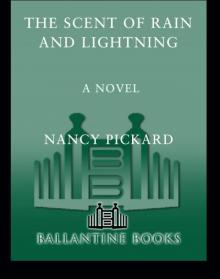 The Scent of Rain and Lightning
The Scent of Rain and Lightning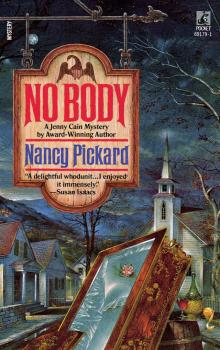 No Body
No Body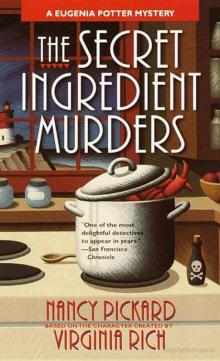 The Secret Ingredient Murders: A Eugenia Potter Mystery
The Secret Ingredient Murders: A Eugenia Potter Mystery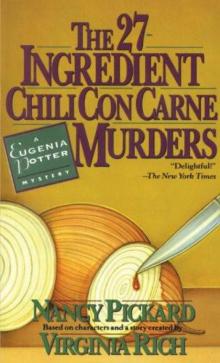 The 27-Ingredient Chili Con Carne Murders: A Eugenia Potter Mystery
The 27-Ingredient Chili Con Carne Murders: A Eugenia Potter Mystery Twilight
Twilight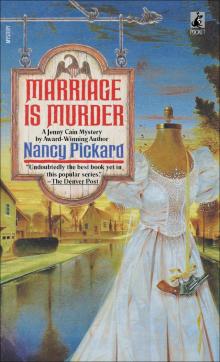 Marriage Is Murder
Marriage Is Murder I.O.U
I.O.U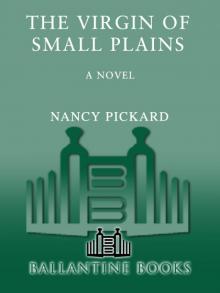 The Virgin of Small Plains
The Virgin of Small Plains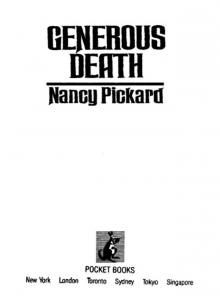 Generous Death
Generous Death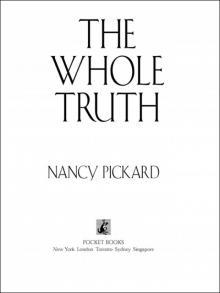 The Whole Truth
The Whole Truth The Blue Corn Murders
The Blue Corn Murders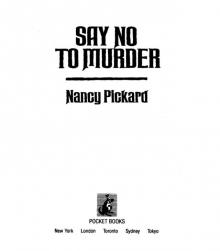 Say No to Murder
Say No to Murder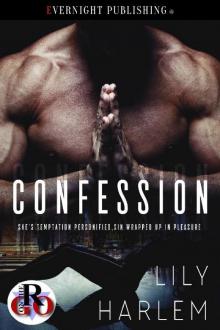 Confession
Confession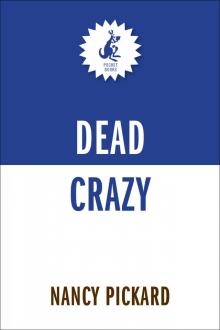 Dead Crazy
Dead Crazy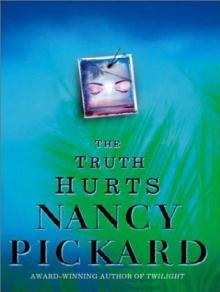 The Truth Hurts
The Truth Hurts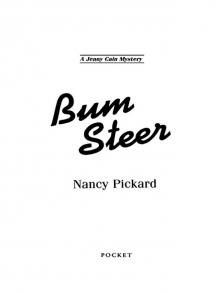 Bum Steer
Bum Steer